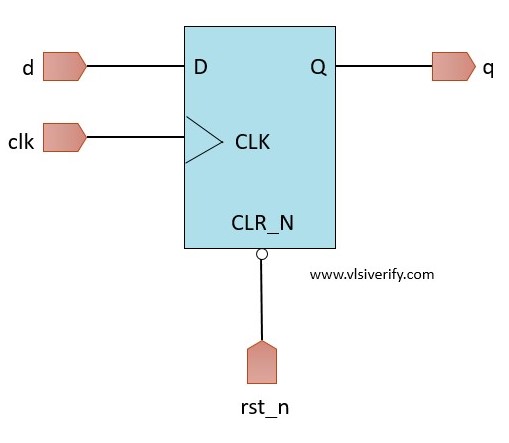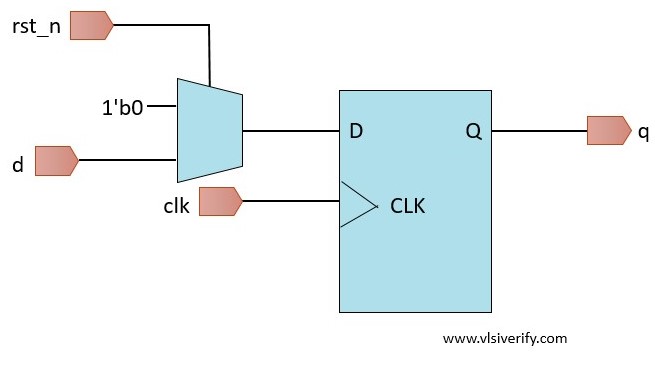Implementation of sequential logic
Basic sequential logic implementation: D Flip flop
The D flip flop is a basic sequential element that has data input ‘d’ is being driven to output ‘q’ as per clock edge. Also, the D flip flop held the output value till the next clock cycle. Hence, it is called an edge-triggered memory element that stores a single bit.
Based on the type of D flip flop, a sensitive list of always block has to be written.
|
D Flip flop types |
Sensitivity list |
|
positive edge-triggered |
always @(posedge clk) |
|
negative edge-triggered |
always @(negedge clk) |
|
positive edge-triggered and asynchronous active high reset |
always @(posedge clk or posedge rst) |
|
positive edge-triggered and asynchronous active low reset |
always @(posedge clk or negedge rst) |
Positive edge-triggered and asynchronous active low reset D flip flop

Design schematic
module D_flipflop (
input clk, rst_n,
input d,
output reg q
);
always@(posedge clk or negedge rst_n) begin
if(!rst_n) q <= 0;
else q <= d;
end
endmoduleTestbench:
module tb;
reg clk, rst_n;
reg d;
wire q;
D_flipflop dff(clk, rst_n, d, q);
always #2 clk = ~clk;
initial begin
clk = 0; rst_n = 0;
d = 0;
#3 rst_n = 1;
repeat(6) begin
d = $urandom_range(0, 1);
#3;
end
rst_n = 0; #3;
rst_n = 1;
repeat(6) begin
d = $urandom_range(0, 1);
#3;
end
$finish;
end
initial begin
$dumpfile("dump.vcd");
$dumpvars(1);
end
endmodulePositive edge-triggered and synchronous active low reset D flip flop

Design schematic
module D_flipflop (
input clk, rst_n,
input d,
output reg q
);
always@(posedge clk) begin
if(!rst_n) q <= 0;
else q <= d;
end
endmoduleTestbench:
module tb;
reg clk, rst_n;
reg d;
wire q;
D_flipflop dff(clk, rst_n, d, q);
always #2 clk = ~clk;
initial begin
clk = 0; rst_n = 0;
d = 0;
#3 rst_n = 1;
repeat(6) begin
d = $urandom_range(0, 1);
#3;
end
rst_n = 0; #3;
rst_n = 1;
repeat(6) begin
d = $urandom_range(0, 1);
#3;
end
$finish;
end
initial begin
$dumpfile("dump.vcd");
$dumpvars(1);
end
endmoduleVerilog Tutorials